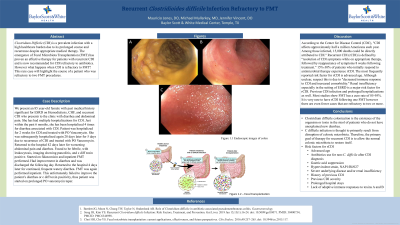Monday Poster Session
Category: Colon
P1693 - Recurrent Clostridioides difficile Infection Refractory to FMT
Monday, October 23, 2023
10:30 AM - 4:15 PM PT
Location: Exhibit Hall

Has Audio

Mauricio Jones, DO
Baylor Scott & White
Temple, TX
Presenting Author(s)
Mauricio Jones, DO1, Michael Mullarkey, MD2, Jennifer Vincent, DO2
1Baylor Scott & White, Temple, TX; 2Baylor Scott & White Medical Center, Temple, TX
Introduction: Clostridium Difficile (CDI) is a prevalent infection with a high healthcare burden due to its prolonged course and recurrence despite appropriate medical therapy. The emergence of Fecal Microbiota Transplantation (FMT) has proven an effective therapy for patients with recurrent CDI and is now recommended for CDI refractory to antibiotics. However what happens when CDI is refractory to FMT? This rare case will highlight the course of a patient who was refractory to two FMT procedures.
Case Description/Methods: We present an 85 year-old female with past medical history significant for ESRD on Hemodialysis, CHF, and recurrent CDI who presents to the clinic with diarrhea and abdominal pain. She has had multiple hospitalizations for CDI. Just within the past 6 months, she has been hospitalized 4 times for diarrhea associated with CDI. Patient was hospitalized for 2 weeks for CDI and treated with PO Vancomycin. She was subsequently hospitalized again 28 days later for 5 days due to recurrence of CDI and treated with PO Vancomycin. Returned to the hospital 42 days later for worsening abdominal pain and diarrhea. Found to be febrile, with leukocytosis, imaging showing pancolitis, and c diff toxin positive. Started on fidaxomicin and inpatient FMT performed. Had improvement in diarrhea and was discharged the following day. Returned to the hospital 4 days later for continued, frequent watery diarrhea. FMT was again performed inpatient. This unfortunately failed to improve patients diarrhea or c diff toxin positivity, thus patient was started on prolonged PO vancomycin taper.
Discussion: According to the Center for Disease Control (CDC), "CDI affects approximately half a million Americans each year. Among those infected, 15,000 deaths could be directly attributed to CDI." Recurrent CDI (rCDI) is defined by "resolution of CDI symptoms while on appropriate therapy, followed by reappearance of symptoms 8 weeks following treatment." 15%-30% of patients who initially respond to antimicrobial therapy experience rCDI. The most frequently reported risk factor for rCDI is advanced age. Although unclear, suspect this is due to "decreased immune response to CDI and increased comorbidity." Renal insufficiency especially in the setting of ESRD is a major risk factor for rCDI. Previous CDI infection and prolonged hospitalizations as well. Most studies show FMT has a cure rate of 85-95%. It is very rare to have rCDI following one FMT however there are even fewer cases that are refractory to two or more.

Disclosures:
Mauricio Jones, DO1, Michael Mullarkey, MD2, Jennifer Vincent, DO2. P1693 - Recurrent Clostridioides difficile Infection Refractory to FMT, ACG 2023 Annual Scientific Meeting Abstracts. Vancouver, BC, Canada: American College of Gastroenterology.
1Baylor Scott & White, Temple, TX; 2Baylor Scott & White Medical Center, Temple, TX
Introduction: Clostridium Difficile (CDI) is a prevalent infection with a high healthcare burden due to its prolonged course and recurrence despite appropriate medical therapy. The emergence of Fecal Microbiota Transplantation (FMT) has proven an effective therapy for patients with recurrent CDI and is now recommended for CDI refractory to antibiotics. However what happens when CDI is refractory to FMT? This rare case will highlight the course of a patient who was refractory to two FMT procedures.
Case Description/Methods: We present an 85 year-old female with past medical history significant for ESRD on Hemodialysis, CHF, and recurrent CDI who presents to the clinic with diarrhea and abdominal pain. She has had multiple hospitalizations for CDI. Just within the past 6 months, she has been hospitalized 4 times for diarrhea associated with CDI. Patient was hospitalized for 2 weeks for CDI and treated with PO Vancomycin. She was subsequently hospitalized again 28 days later for 5 days due to recurrence of CDI and treated with PO Vancomycin. Returned to the hospital 42 days later for worsening abdominal pain and diarrhea. Found to be febrile, with leukocytosis, imaging showing pancolitis, and c diff toxin positive. Started on fidaxomicin and inpatient FMT performed. Had improvement in diarrhea and was discharged the following day. Returned to the hospital 4 days later for continued, frequent watery diarrhea. FMT was again performed inpatient. This unfortunately failed to improve patients diarrhea or c diff toxin positivity, thus patient was started on prolonged PO vancomycin taper.
Discussion: According to the Center for Disease Control (CDC), "CDI affects approximately half a million Americans each year. Among those infected, 15,000 deaths could be directly attributed to CDI." Recurrent CDI (rCDI) is defined by "resolution of CDI symptoms while on appropriate therapy, followed by reappearance of symptoms 8 weeks following treatment." 15%-30% of patients who initially respond to antimicrobial therapy experience rCDI. The most frequently reported risk factor for rCDI is advanced age. Although unclear, suspect this is due to "decreased immune response to CDI and increased comorbidity." Renal insufficiency especially in the setting of ESRD is a major risk factor for rCDI. Previous CDI infection and prolonged hospitalizations as well. Most studies show FMT has a cure rate of 85-95%. It is very rare to have rCDI following one FMT however there are even fewer cases that are refractory to two or more.

Figure: Images from Colonoscopy
A - pseudomembranous colitis
A - pseudomembranous colitis
Disclosures:
Mauricio Jones indicated no relevant financial relationships.
Michael Mullarkey indicated no relevant financial relationships.
Jennifer Vincent indicated no relevant financial relationships.
Mauricio Jones, DO1, Michael Mullarkey, MD2, Jennifer Vincent, DO2. P1693 - Recurrent Clostridioides difficile Infection Refractory to FMT, ACG 2023 Annual Scientific Meeting Abstracts. Vancouver, BC, Canada: American College of Gastroenterology.
